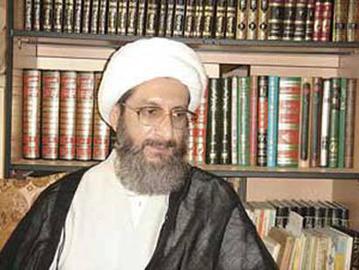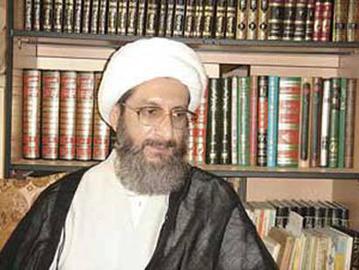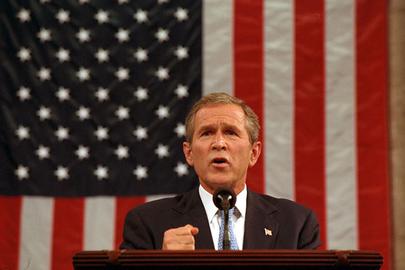
Abdol-Hamid Masoumi-Tehrani was born in Tehran to a clerical family and became a marja-e taqlid, or a source of emulation, the most senior ranking in the Shia clergy, in 1988. But during these years, as Masoumi gained his ayatollah credentials, the Iranian regime frowned up his growing prominence. His work and ideas on Islamic law and jurisprudence (sharia and figh), and indeed his entire worldview as a cleric, proved sensitive and controversial. When Masoumi, for example, decided to produce the Torah, Psalms, and Koran in calligraphy to foster dialogue between religions, the Iranian Intelligence Ministry pressured him to suspend the project. His recent meetings with members of the Baha'i faith, who are persecuted by the Iranian authorities, also irked the religious and political establishment. When Masoumi said that it was not easy to find more degenerate views in today's world than the ones held by radical and rigid-minded Muslims, he sealed his status as a thorn in the side of the Islamic Repubic.
Masoum Tehrani does not believe in making a living through religion, and spends his time sewing and creating works of calligraphy. Since the age of 23 he has spent much of his time in either prison or detention and is regularly being summoned by the authorities. For these reasons he has never been able to marry but says he considers his students and the country's youth his children. IranWire talked with Ayatollah Masoumi about his critique of the Islamic Republic and the way Islamic law is enforced on Iranian society today.
How much time did you spend on your Torah and Psalms project and ultimately what kind of reaction did you face? Were the responses mostly negative or positive?
In 2001, coinciding with the 'Year of Dialogue Among Civilizations' proposed by former president Mohammad Khatami, I sent several letters about creating this work to the president and Supreme Leader. Unfortunately, three months later the Supreme Leader's office contacted me and said: "The Supreme Leader sends his greetings and advises against this work." No explanation was given. No contact was made from the president's office, and after some time officers from the Ministry of Culture and Islamic Guidance arrived at my office to account for the Torah in my posession. I warned them that if they seized books from my office I wouldn't relent in publicly embarrassing the man who proposed the idea of Dialogue Among Civilizations, since it was clear that the officers had been sent on the order of top government officials. The officers denied that Khatami had sent them to stop my Torah project but told me they would leave and discuss the matter with officials and get back to me. They never did.
After the incident I issued some statements regarding my Torah project and I was contacted by Abbas Milani in Washington who expressed positive reception for the work by some intellectuals and supporters of art outside of Iran, but the reaction inside Iran was negative, but not violent. If I recall correctly, it was from 2004, after I issued statements about the book of Psalms, that the threats began. Then I felt I had to take some necessary measures, including the removal of my telephone number and home address from websites.
In a letter to the Intelligence Ministry you spoke of threats and inducements to prevent your project from being published. Why do you think the Iranian regime was so sensitive about this project?
You would have to ask them why they were so sensitive, but I imagine it was due to complaints from a number of vocal, self-righteous individuals. There are two reasons for this. First, they don't have a correct understanding of the meaning of these works. Some of them thought that calligraphy and decorative production of Holy Scriptures is tantamount to the promotion of those beliefs, while in our capacity as producers of art we made no judgment as to the truth or falsehood of the work. That portion is separate from the message of peace and peaceful living.
Within the regime there were and still are individuals who approve of my project but their voices haven’t prevailed. Of course in every society there are some who benefit from division and hate mongering and I hope their numbers gradually decrease.
What kind of pressures have you faced until now and what specifically was deemed problematic by authorities?
Perhaps no pressure is greater than being unable to live a normal life, to have to live in fear that your home might be raided every time someone knocks at the door. Personally I don't fear arrest or imprisonment but I'm worried for my mother, who is over 80 now and I have an obligation to care and attend to her. Since 1989 this elderly woman has been either in court or in prison so I am trying not to give her additional stress in her remaining years.
You have said you make a living by selling your artwork and do not believe in making money through religion. Could you elaborate on this and tell us about how and when you came to this decision?
I decided this when I was studying in the seminary with a friend of mine. We went to see the late Ayatollah Seyyed Abolfazl Naeeni, who advised, or perhaps spoke something that was in his heart, and told us if we intend to pursue our lives in this field, we should definitely acquire an additional skill-set so that our living doesn't depend on our religious work. Otherwise every time a person comes across a truth, they will find themselves disenchanted and fearful about whether they should express their discovery or not. This advice stuck in my mind and I immediately went to work at a tailoring workshop for men. Even though our family at the time was financially secure and I did not need the money, I took the late Naeeni's suggestion to heart and occupied myself with learning the trade as one of our neighbors was in the tailoring business. Even though it has been years since I've done tailoring work, I could easily sew any kind of shirt without working from a template.
Later I met professor Majd who had a nice writing style and a great imagination. Even as a child I was interested in calligraphy and art, particularly oil painting. I even pursued it for a little while. The intricacies, elegance, and subtleties fascinated me and so I began work under professor Majd while working on calligraphy on the side. I learned the nastaliq style of script from professor Majd and from then on formally entered work in calligraphy and art until it gradually became my career. Generally speaking the pay is modest and finding buyers is difficult, but thankfully I get by.
You are of the belief that the goal of religion isn't governance, so how do you explain the formation of government by the prophet Mohammad and the imams? Do you believe that establishment of an Islamic government, like the one existing in Iran today, harms Islam?
The prophet of Islam did not rule over the people but rather played a mediating role between them. Nowhere did he say Islam was brought to govern or rule, rather it was brought to guide ethics and morals. The governing structure formed at about the time of Caliph Omar and the reason might be due to the conquests that took place in his time and that administration of the newly occupied areas required some governing structure.
The task of government is to provide order in worldly matters for its people while religion seeks to advise and guide humanity in strengthening of morals and spirituality. Mixing the two results in the worst type of damage to the teachings of religion. The nature of governance inclines toward corruption. Humanity has expended great effort to minimize these governmental tendencies but hasn't succeeded in eliminating them. When religion, which is connected to the heart and morality, is mixed with government, all kinds of decay and corruption get attributed to religion. This is what happened in the rule of the Popes and by the Ottomans, and both resulted in creating distance between the people and religion.
You have said that if the Koran was revealed today, the rights of men and women would be declared equal. Do you believe that the prophet of Islam, in announcing Truths, did so within the context of the conditions of his time? Are there other cases or examples you can point to where Islamic law is out of sync with the world today and needs revision?
All religious law is based on the social conditions and understanding of the particular time and space they occur in and they change or adjust over time. What I am saying is nothing new. For instance, slavery is, in a way, permitted in Islam. This is no longer the case today and the marjas (clerical sources of emulation) either try to avoid the issue or attribute it to the time of the prophet or even interpret it as permissible in extremely rare conditions.
On this basis, why shouldn't we reinterpret other laws such as equality between men and women according to the conditions of our time? This is possible today and the task of the religious scholars is to address these issues with attention to their current social environment.
Do you agree with the 'morality police' who deal with and enforce what they consider appropriate Islamic dress in Iran?
This behavior and pressure leads to indecency in secret, deception, hypocrisy, and lying that gradually eats away at the moral and ethical foundations of society like a termite that piece by piece corrodes something from the inside until it’s destroyed and society is brought to ruin. Religiousness, or lack-thereof, can't be applied by force. If force produced results there would be no churches in areas formerly under Soviet control where many churches were turned into stables.
Are you optimistic about the prospect of greater civil liberties and eased pressure on religious minorities such as the Baha'i under President Rouhani?
If it happens it would be incremental and more like a band-aid than a cure. The pressures and discrimination need to be resolved by addressing the roots and foundations. Therefore until there is fundamental change or reform, these problems will continue to exist regardless of who comes and goes.
visit the accountability section
In this section of Iran Wire, you can contact the officials and launch your campaign for various problems






















comments